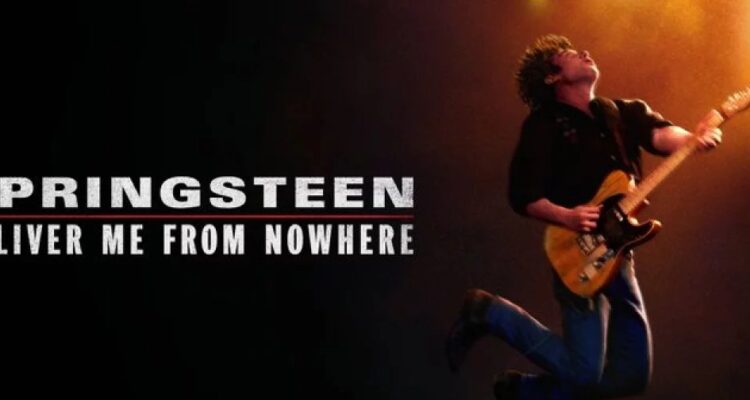“When you feel in your gut what you are and then dynamically pursue it – don’t back down and don’t give up – then you’re going to mystify a lot of folks.” – Bob Dylan.
I couldn’t tell you the last time (if ever) I wrote about a movie I had just seen. I wouldn’t say this is as much a review as an editorial of sorts. I’m not getting paid off by anyone to say nice things, so you can just put that to rest. I am a massive fan of this era of Bruce Springsteen. Hell, my two favorite Springsteen albums are Nebraska and The Ghost of Tom Joad, which is most likely why I ran—not walked—to see Deliver Me From Nowhere. I was able to catch i while in Atlanta recently, and I was one of about 4 or 5 people max in the theater. I went to one of those cool “eat a meal and watch a movie” places. I ordered some chicken fingers and fries, settled in for the movie, and I was good to go.
I recently started reading lots of posts on social media that the movie was a flop. People complained about it, saying it was boring. That’s interesting because I had the opposite issue. I was expecting it to be boring, and I was so wrong. I’m sure when people see the word “bio-pic,” they assume it’s a life story from birth to now.” That isn’t what they got.
Deliver Me From Nowhere takes place in what is probably his darkest era —the period between The River and what would become his most iconic release, Born In The U.S.A. The movie’s overall premise is that this is what Springsteen needed most in his career at that point. He was exhausted after lengthy tours and marathon live shows that sometimes ran over three hours. He was exhausted mentally, physically, and emotionally.
Jeremy Allen White did such a great job portraying Springsteen that I almost immediately forgot it was White playing the role. That’s a sign of a great actor. He literally became Bruce. He studied his conversations, his stage moves, his emotions, and even played guitar and sang on all the songs in the movie. When it came time to channel Springsteen’s feelings and expressions, White stepped up and became Springsteen.
The movie is exceptionally well done, and the visuals and flashback sequences all have a place and time in this film, and it always seemed to work, leading into Springsteen moving forward and finding strength in his music. At this point, he was also coming to terms with his mental health (depression, anxiety, etc.) The movie captured this dark era without glossing over it. They went right to the core of this era of Springsteen, and I believe it’s always so overlooked.
Rarely does anyone in the music press talk about the Nebraska era. The press never seemed to care much about it, and it seemed that even most of his hardcore fans didn’t seem to really dig it. They didn’t understand what Nebraska was or its importance to Springsteen’s career and his personal life. They might not even understand the significance it has in someone else’s life, like mine.
Nebraska opened my eyes and ears to Springsteen. It also opened the door for folk music to find some success outside underground coffeehouses. That the beds of a pickup truck could be a theater stage, and that people could listen to, connect with, and embrace the simplicity of music without the volume and large-scale production.
Nebraska proves that less is more. Stripping the music down to its very foundation, guitar and vocals —opens the door to be a bit looser and more creative; it’s also not a time to phone it in. If you’re going to do a truly solo album, you need to be on top of your game and have your shit together. You have to have the confidence to know that even if people don’t hear it at all, you have made the best possible music you could and that it’s something you can walk away from, look back on, and smile.
Deliver Me From Nowhere was that extra bit of reassurance and inspiration that I needed at this point in my artistic life. This year, I released my darkest album to date, and it was a truly gratifying but scary and nerve-racking experience. Seeing Springsteen’s story of this dark period in his life is something I can connect with. It’s a reminder that even the biggest of them all can still struggle with depression, anxiety, and the need just to shut up all the voices and noise.
Nebraska wasn’t just an album. It was a crucial part of Springsteen’s life that needed to be exorcised and shared with the world, and a life-changing album for me. Springsteen was out to make a personal time capsule of sorts about a time where, even when the lows were at their lowest, music was what saved the day every time.

